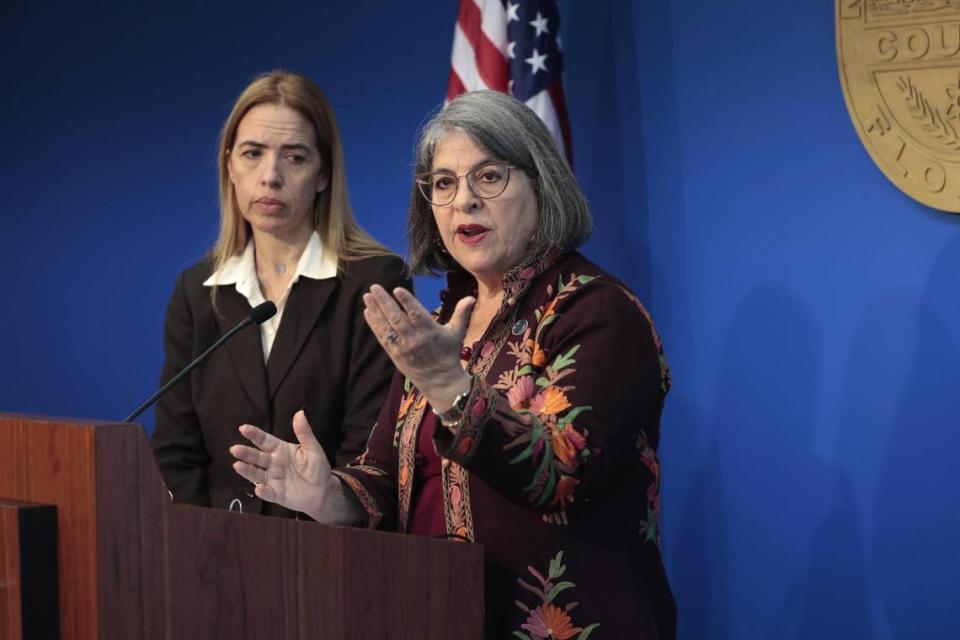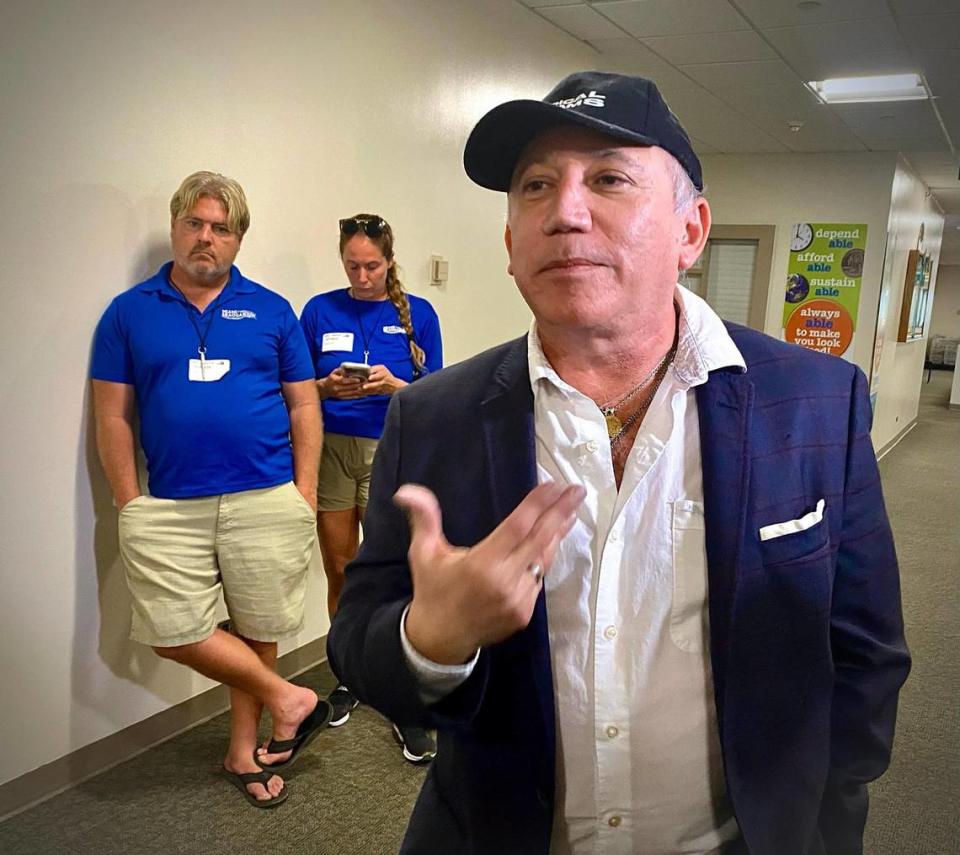Miami-Dade County moves to evict Miami Seaquarium, gives park until April to vacate
- Oops!Something went wrong.Please try again later.
Miami-Dade County on Thursday gave the Miami Seaquarium weeks to vacate its government-owned campus after a string of federal inspection reports alleged poor care of animals there.
The notice terminating the Seaquarium’s county lease moves Miami-Dade dramatically closer to ejecting the Seaquarium from its home of nearly 70 years in a rapid escalation of the confrontation between Mayor Daniella Levine Cava and the company that took over the for-profit operation in 2022.
“This decision did not come lightly,” Levine Cava said at an afternoon press conference. “But the situation at the Seaquarium is so dire that we believe terminating the lease is the best course of action to assure safety for all.”
In a letter from the mayor’s office Thursday morning, Miami-Dade ordered the Seaquarium to surrender its waterfront property by April 21.
“Lessee’s long and troubling history of violations constitute repeated, continuing longstanding violations of Lessee’s contractual obligations to keep the property in a good state of repair, maintain animals in accordance with applicable law, and comply with all laws,” read the letter from Jimmy Morales, chief operating officer under Levine Cava.

READ MORE: County moves to cancel Miami Seaquarium lease after critical federal inspections
The letter starts a process that Seaquarium executives said Thursday would lead to a court fight as they dismissed the county’s claims as misleading and uninformed.
“I will just let my lawyers defend our rights,” Eduardo Albor, president of the Dolphin Company, Seaquarium’s parent company, said in a fiery exchange with reporters in a County Hall lobby outside where Levine Cava held her press conference minutes earlier. “The mayor is lying.”
In his letter, Morales gave Albor a Monday deadline to sign an agreement to surrender the county property by the April 21 termination date. If the Seaquarium does not agree to give up the 38-acre site, Morales wrote, Miami-Dade “shall avail itself of any and all legal means to enforce its rights and remedies.”
The letter and Albor’s comments highlighted the collapse of what was once an alliance between Levine Cava and the Dolphin Company, the Mexico-based marine-park conglomerate that acquired the Seaquarium lease in 2022. As part of the Dolphin Company winning county approval for its lease transfer from the park’s prior owners, the company had agreed to a goal of moving the Seaquarium’s aging killer whale, Lolita, to her home waters off Washington state. While Albor joined Levine Cava for a joint announcement in March 2023, Lolita — also known as Toki, a derivative of the name given to her by the Lummi Nation in Washington — died in August from what an autopsy found was liver failure.

Edwin Gonzalez, executive director of the Dolphin Company, said the attraction’s relationship with the Levine Cava administration deteriorated after Lolita’s death.
At one point, he said, the Dolphin Company proposed moving the Miami Wilds project from its controversial planned location outside Zoo Miami to the Seaquarium as part of an expansion to include more revenue-production options, including upgraded restaurants.
“We had to demolish the area around Toki’s tank, and we could put a water park there,” he said. Gonzalez said the administration rejected the idea, something that was followed by increased inspections and warnings of a lease default.
In late December, the mayor’s administration notified the Seaquarium that it planned to terminate the lease based on unpaid rent and other alleged violations of the lease terms. Levine Cava followed up with a letter in late January slamming the Seaquarium for what the U.S. Department of Agriculture said was unacceptable care for captive dolphins and other animals in the for-profit park.
“We believe it is imperative to address these serious violations decisively and with urgency,” Levine Cava wrote in the Jan. 24 letter to Albor. Weeks later, the Seaquarium posted a statement on social media accusing Levine Cava of “misinforming people” about animal care at the Seaquarium and lamented that the issue was being “used for political purposes.”
In other statements, the Seaquarium said it was addressing violations or issues cited in USDA inspection reports.
The park can challenge the eviction in court. For now, the Seaquarium remains open as a tenant of Miami-Dade.
Opened in 1955, the Seaquarium was once a showpiece of Miami’s tourism industry as one of the nation’s first theme parks centered on marine mammals. Its captive dolphins drew global attention after the Flipper television series was filmed there in the 1960s.
In the decades that followed, the Seaquarium became a target for animal-rights activists protesting conditions at the county-owned facility. Much of the attention went to Lolita, the Seaquarium’s lone captive orca living in a tank built for spectator shows.
With the Seaquarium’s future on the Miami waterfront hinging on a legal victory, the county’s action raises questions about what’s next for the prime Miami-Dade land. Levine Cava said the Seaquarium site is part of the county’s parks system and would be governed by the same charter provision that requires a referendum before allowing a different commercial use for the land.
Raquel Regalado, the Miami-Dade commissioner whose district includes the Seaquarium site, said the park’s condition has deteriorated to the point that a change was needed.
“As a native Miamian, there is so much nostalgia associated with the Miami Seaquarium,” she said at the press conference. “However, the current state of the Miami Seaquarium is not the place we visited as children and not the place we want our children to visit.”
The alleged failures by the Seaquarium that are grounds for lease termination, according to the county, include:
Animal care
Miami-Dade cited violations of federal animal-care regulations reported by the USDA going back to 2022 and as recently as January. The letter also cited a USDA report that says a dolphin bit a visitor, as well as findings that the Seaquarium didn’t have enough staff on hand to manage its population of dolphins, manatees, birds, fish, sea lions, penguins and other creatures. “Our number one priority continues to be the safety and well-being of the animals, and moving forward we’ll do everything we can to make sure they are well cared for,” Levine Cava said at the press conference.
Maintenance
While Lolita was alive, the stadium that included her tank was shut down to the public because of building-code violations. That was one of multiple outstanding building-code violations cited in the county’s letter, including failure to maintain the manatee tank and the “Flipper Stadium” where dolphins perform.
Certifications
The Seaquarium’s revised lease includes requirements that it remain in good standing with veterinary and animal-park groups. The letter stated the county had no records of certifications from the Alliance of Marine Mammal Parks and Aquariums or the American Humane Association.
Andrew Scullion, supervisor of animal training at the Seaquarium, said the park has responded to USDA findings with corrective measures and pointed out violations it felt were not warranted. He said the Dolphin Company, which has marine-mammal attractions around the world, provides backup staff and expertise as needed.
“I do think it’s a safe home for these animals,” he said.

